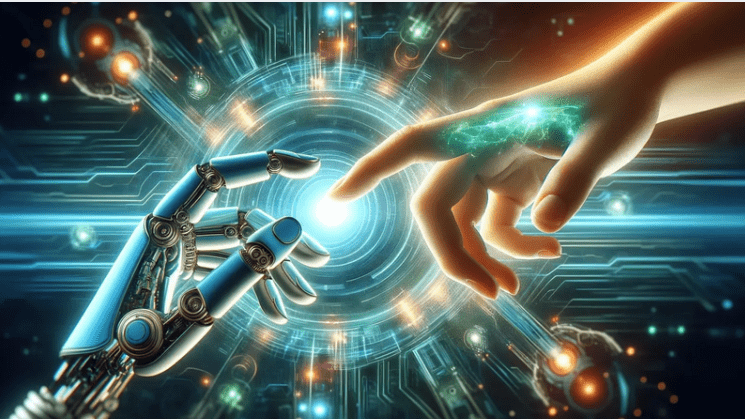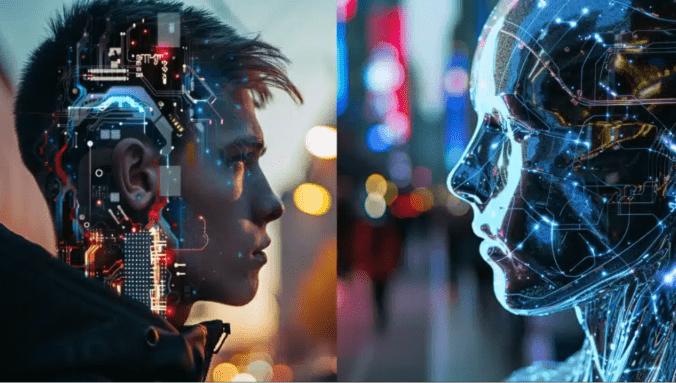Artificial Intelligence (AI) is rapidly transforming every aspect of our lives, from how we work to how we communicate. One of the most promising applications of AI is in healthcare, where its potential to improve patient care, streamline medical processes, and drive innovations is unmatched. The integration of AI into healthcare is helping to solve some of the most pressing challenges faced by the industry, including limited resources, rising healthcare costs, and the need for personalized treatment.
In this article, we will explore how AI is revolutionizing medicine, the key innovations driving these changes, and the benefits and challenges associated with AI adoption in healthcare.
1. AI in Diagnostics: Accelerating Early Detection and Accurate Diagnosis
Overview
Early diagnosis is critical to effective treatment and better patient outcomes. AI, powered by machine learning algorithms and vast amounts of data, is improving the speed and accuracy of diagnostics, enabling healthcare professionals to identify conditions earlier than ever before. From detecting cancers to identifying heart disease, AI-driven diagnostic tools are providing doctors with valuable insights that can save lives.
Key Innovations in Diagnostic AI
- Medical Imaging: AI’s ability to analyze medical images such as X-rays, MRIs, and CT scans has proven to be a game-changer in radiology. Machine learning models can be trained to recognize patterns and anomalies in medical images that may be too subtle for the human eye to detect. For example, AI algorithms are now being used to identify early-stage lung cancer from CT scans, often with greater accuracy than human radiologists.
- Pathology: AI is also revolutionizing pathology by assisting pathologists in analyzing tissue samples. AI algorithms can scan thousands of tissue samples in a fraction of the time it would take a human pathologist, reducing diagnostic errors and ensuring faster results.
- AI for Disease Detection: Machine learning algorithms can analyze large datasets of patient health records, genetic information, and lab results to identify early signs of diseases such as diabetes, cardiovascular diseases, and cancers. These tools can flag high-risk patients and suggest personalized interventions long before symptoms appear.
- Telemedicine and Remote Diagnostics: AI-powered telemedicine platforms can analyze symptoms and provide recommendations for further testing or treatments. In remote areas, where access to healthcare professionals may be limited, AI tools can provide diagnostic support to ensure that patients receive the right care.
Impact on Healthcare
The ability of AI to assist with early diagnosis is having a profound impact on healthcare. By identifying diseases early, AI helps healthcare providers intervene sooner, improving patient outcomes and reducing the burden of advanced-stage treatments. Additionally, AI’s diagnostic capabilities are helping to alleviate the shortage of healthcare professionals, enabling faster and more accurate assessments of patient health.
2. AI in Personalized Medicine: Tailoring Treatments to Individuals
Overview
Personalized medicine is an approach that takes into account an individual’s unique genetic makeup, lifestyle, and environmental factors to deliver targeted treatments. AI is making personalized medicine more accessible by analyzing vast amounts of data, including genetic profiles, health histories, and lifestyle factors, to create customized treatment plans for patients.
Key Innovations in Personalized Medicine
- Genomics and Precision Medicine: AI is revolutionizing genomics by analyzing genetic data to identify mutations, gene expressions, and other genetic factors that may contribute to diseases. With AI, scientists and doctors can better understand the genetic basis of diseases like cancer, enabling the development of targeted therapies that can specifically address these genetic issues.
- AI in Drug Development: AI is streamlining the drug discovery and development process by predicting how different compounds will interact with the body. By analyzing vast datasets of molecular structures, AI models can identify promising drug candidates, reducing the time and cost associated with traditional drug development. This has the potential to bring life-saving medications to market faster.
- AI-Driven Health Monitoring: Wearable devices powered by AI are continuously monitoring a patient’s health, providing real-time data on vital signs, sleep patterns, physical activity, and more. This data can be used to create personalized health plans, helping individuals manage chronic conditions or optimize their well-being based on real-time insights.
- AI in Treatment Optimization: AI tools can assist healthcare providers in determining the most effective treatment options for individual patients based on their unique health profile. By analyzing data from clinical trials, patient records, and outcomes, AI can suggest treatments that are more likely to succeed for specific patients, improving the chances of recovery and reducing side effects.
Impact on Healthcare
Personalized medicine powered by AI holds the promise of significantly improving patient care. By tailoring treatments to the individual, AI can reduce the trial-and-error approach that is often associated with traditional medicine, leading to more effective, efficient, and less invasive treatments. This approach can also help address health disparities by providing more equitable care that is adapted to an individual’s needs.
3. AI in Drug Discovery: Revolutionizing the Development of Life-Saving Medications
Overview
The development of new drugs traditionally takes years of research and testing. AI is shortening the drug discovery process by predicting how different compounds will affect the human body. By analyzing molecular structures and biological pathways, AI is enabling researchers to identify promising drug candidates faster and more efficiently than ever before.
Key Innovations in AI for Drug Discovery
- Predictive Analytics for Drug Design: Machine learning algorithms can analyze chemical structures and predict how compounds will interact with biological targets. This allows researchers to identify potential drug candidates that have a higher likelihood of success. AI can also simulate drug interactions, optimizing the selection of drug molecules before human trials begin.
- Biomarker Discovery: AI is being used to identify biomarkers that can predict how patients will respond to treatments. These biomarkers are essential for developing targeted therapies and improving drug efficacy. AI algorithms analyze large datasets of genomic, proteomic, and clinical data to identify the molecular markers associated with diseases, paving the way for more precise and effective drugs.
- AI in Clinical Trials: Clinical trials are essential for testing the efficacy and safety of new drugs, but they can be time-consuming and costly. AI is improving clinical trials by helping to identify the most suitable candidates for trials, analyzing patient data in real time, and predicting the outcomes of clinical studies. By optimizing clinical trials, AI is speeding up the process of bringing drugs to market.
- Repurposing Existing Drugs: AI can also be used to identify new uses for existing drugs. By analyzing vast databases of drug-related data, AI can uncover previously unrecognized therapeutic potentials, enabling the repurposing of drugs to treat diseases that they were not originally designed for. This is especially valuable in situations where urgent treatments are needed, such as in the case of pandemics.
Impact on Healthcare
AI in drug discovery is transforming the pharmaceutical industry by accelerating the development of new medications, improving the efficiency of clinical trials, and reducing the cost of drug development. AI is making it possible to identify effective treatments faster, bringing life-saving medications to market more quickly and helping to address unmet medical needs.
4. AI in Patient Monitoring: Enhancing Care Through Real-Time Data
Overview
Continuous monitoring of patients’ health is critical, especially for those with chronic conditions or in critical care settings. AI is improving patient monitoring by analyzing real-time data from wearable devices, hospital equipment, and electronic health records (EHRs) to provide healthcare providers with actionable insights and alerts.
Key Innovations in AI for Patient Monitoring
- Wearable Health Devices: Devices like smartwatches, ECG monitors, and glucose sensors collect real-time data on a patient’s health. AI algorithms analyze this data to detect early signs of deteriorating health, such as changes in heart rate, blood pressure, or blood sugar levels, enabling healthcare providers to intervene before a patient’s condition worsens.
- Remote Patient Monitoring (RPM): Remote patient monitoring allows healthcare providers to track patients’ health outside of the traditional clinical setting. AI tools analyze patient data from home-based sensors and wearables, helping doctors detect early warning signs of complications in chronic diseases such as diabetes, heart disease, and respiratory conditions.
- Predictive Analytics for Patient Care: AI can predict the likelihood of complications based on a patient’s medical history and real-time health data. For example, AI can predict the risk of sepsis in ICU patients by analyzing trends in vital signs and laboratory results, allowing healthcare providers to act quickly and reduce the risk of life-threatening complications.
- AI-Powered Hospital Management: AI is also improving hospital operations by optimizing bed management, predicting patient admissions, and improving resource allocation. By analyzing patient flow data, AI can ensure that hospitals are better prepared for peak times and can allocate resources more effectively.
Impact on Healthcare
AI in patient monitoring is enhancing healthcare by providing real-time insights into patients’ conditions, improving the speed and accuracy of interventions, and reducing hospital readmissions. Continuous monitoring allows healthcare providers to keep patients out of emergency rooms and improve their overall health outcomes by detecting issues before they become critical.
5. AI in Administrative Tasks: Streamlining Healthcare Operations
Overview
AI is not only transforming clinical care but also helping streamline administrative tasks in healthcare settings. By automating routine tasks such as billing, scheduling, and data entry, AI is allowing healthcare professionals to focus more on patient care and less on administrative work.
Key Innovations in Administrative AI
- Automated Documentation: AI-powered tools can transcribe doctor-patient conversations and automatically populate electronic health records (EHRs), reducing the time doctors spend on paperwork. This helps improve workflow efficiency and allows healthcare providers to spend more time with patients.
- Medical Billing and Coding: AI is also improving the accuracy and efficiency of medical billing and coding by automating the process of classifying diagnoses and procedures. AI tools can scan clinical records, identify relevant codes, and ensure that billing is compliant with regulations.
- Appointment Scheduling: AI-driven scheduling systems can automatically schedule appointments based on doctor availability, patient preferences, and urgency. These systems can also send reminders and handle cancellations, reducing administrative burdens.
Impact on Healthcare
AI is improving the efficiency of healthcare operations by automating routine tasks, reducing the risk of human error, and freeing up healthcare professionals to focus on what they do best—providing care. By streamlining administrative processes, AI can help reduce healthcare costs, improve patient experiences, and enhance overall operational efficiency.
FAQs
1. How is AI used in healthcare?
AI is used in healthcare to improve diagnostics, personalize treatment, discover new drugs, monitor patients, and streamline administrative tasks. It analyzes large datasets to identify patterns, optimize workflows, and assist healthcare professionals in decision-making.
2. What are the benefits of AI in healthcare?
The benefits of AI in healthcare include more accurate diagnoses, faster treatment, personalized care, improved patient outcomes, reduced healthcare costs, and more efficient administrative processes.
3. Is AI replacing doctors in healthcare?
No, AI is not replacing doctors but rather assisting them in making more accurate and efficient decisions. AI enhances doctors’ ability to diagnose, treat, and monitor patients, but human expertise and patient care remain essential.
4. How does AI impact patient privacy?
AI raises concerns about patient privacy because of the vast amounts of data it collects. It is crucial to implement robust data security and privacy measures to ensure that AI systems handle patient data safely and ethically.
5. What is the future of AI in healthcare?
The future of AI in healthcare looks promising, with continued advancements in areas like personalized medicine, drug discovery, patient monitoring, and administrative automation. AI is expected to further enhance the quality of care, reduce costs, and make healthcare more accessible to people worldwide.
AI is not just a passing trend in healthcare—it is transforming the entire landscape of the industry. From diagnostics to drug discovery, patient care to administrative processes, AI is enabling more efficient, personalized, and cost-effective healthcare. As technology advances, we can expect even more profound changes that will improve patient outcomes and revolutionize how healthcare is delivered around the world.



